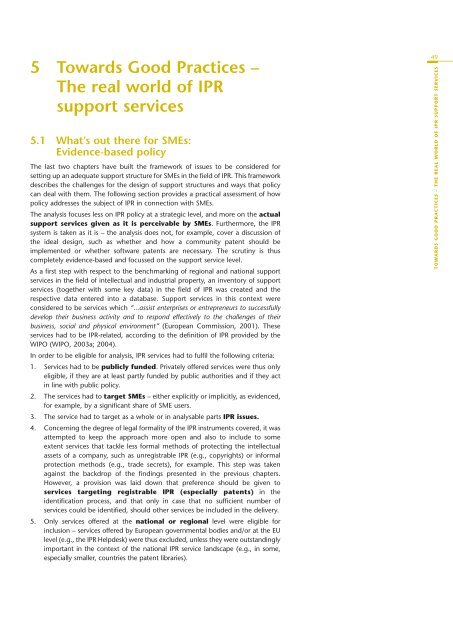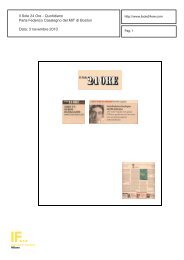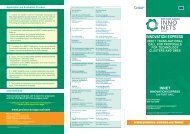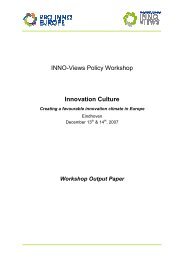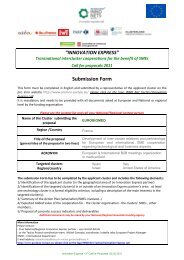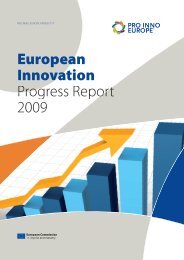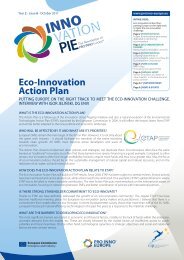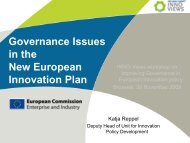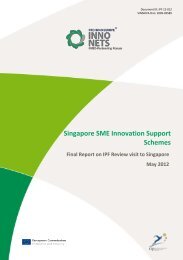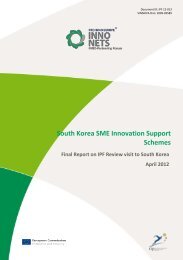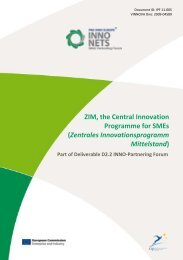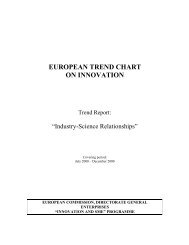Benchmarking National - PRO INNO Europe
Benchmarking National - PRO INNO Europe
Benchmarking National - PRO INNO Europe
You also want an ePaper? Increase the reach of your titles
YUMPU automatically turns print PDFs into web optimized ePapers that Google loves.
5 Towards Good Practices –<br />
The real world of IPR<br />
support services<br />
5.1 What’s out there for SMEs:<br />
Evidence-based policy<br />
The last two chapters have built the framework of issues to be considered for<br />
setting up an adequate support structure for SMEs in the field of IPR. This framework<br />
describes the challenges for the design of support structures and ways that policy<br />
can deal with them. The following section provides a practical assessment of how<br />
policy addresses the subject of IPR in connection with SMEs.<br />
The analysis focuses less on IPR policy at a strategic level, and more on the actual<br />
support services given as it is perceivable by SMEs. Furthermore, the IPR<br />
system is taken as it is – the analysis does not, for example, cover a discussion of<br />
the ideal design, such as whether and how a community patent should be<br />
implemented or whether software patents are necessary. The scrutiny is thus<br />
completely evidence-based and focussed on the support service level.<br />
As a first step with respect to the benchmarking of regional and national support<br />
services in the field of intellectual and industrial property, an inventory of support<br />
services (together with some key data) in the field of IPR was created and the<br />
respective data entered into a database. Support services in this context were<br />
considered to be services which “...assist enterprises or entrepreneurs to successfully<br />
develop their business activity and to respond effectively to the challenges of their<br />
business, social and physical environment” (<strong>Europe</strong>an Commission, 2001). These<br />
services had to be IPR-related, according to the definition of IPR provided by the<br />
WIPO (WIPO, 2003a; 2004).<br />
In order to be eligible for analysis, IPR services had to fulfil the following criteria:<br />
1. Services had to be publicly funded. Privately offered services were thus only<br />
eligible, if they are at least partly funded by public authorities and if they act<br />
in line with public policy.<br />
2. The services had to target SMEs – either explicitly or implicitly, as evidenced,<br />
for example, by a significant share of SME users.<br />
3. The service had to target as a whole or in analysable parts IPR issues.<br />
4. Concerning the degree of legal formality of the IPR instruments covered, it was<br />
attempted to keep the approach more open and also to include to some<br />
extent services that tackle less formal methods of protecting the intellectual<br />
assets of a company, such as unregistrable IPR (e.g., copyrights) or informal<br />
protection methods (e.g., trade secrets), for example. This step was taken<br />
against the backdrop of the findings presented in the previous chapters.<br />
However, a provision was laid down that preference should be given to<br />
services targeting registrable IPR (especially patents) in the<br />
identification process, and that only in case that no sufficient number of<br />
services could be identified, should other services be included in the delivery.<br />
5. Only services offered at the national or regional level were eligible for<br />
inclusion – services offered by <strong>Europe</strong>an governmental bodies and/or at the EU<br />
level (e.g., the IPR Helpdesk) were thus excluded, unless they were outstandingly<br />
important in the context of the national IPR service landscape (e.g., in some,<br />
especially smaller, countries the patent libraries).<br />
49<br />
TOWARDS GOOD PRACTICES – THE REAL WORLD OF IPR SUPPORT SERVICES


